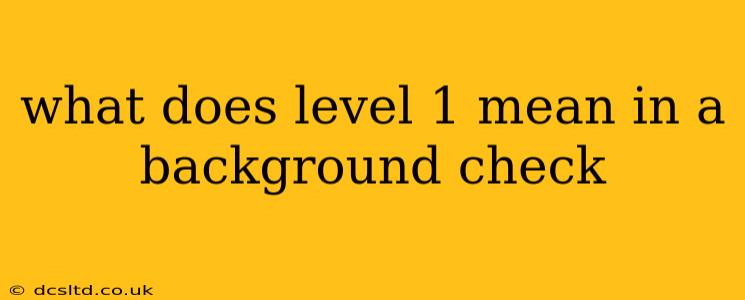What Does Level 1 Mean in a Background Check?
The meaning of "Level 1" in a background check is not standardized. There's no universally accepted definition across all background check companies or industries. The terminology used varies significantly depending on the provider and the specific requirements of the employer or organization requesting the check.
Therefore, understanding what "Level 1" signifies requires looking at the specific documentation provided by the background check company. The report should clearly outline what information was included in the Level 1 screening. It could represent a basic check, a more comprehensive one, or something entirely different depending on the context.
Instead of focusing solely on the "Level 1" designation, pay closer attention to the specific data points included in the report. This is what truly matters. A Level 1 background check might include some or all of the following:
What Might Be Included in a "Basic" Background Check (Often Mislabeled as Level 1):
- Identity Verification: Confirming the applicant's name, date of birth, Social Security number, and address history. This is usually a fundamental component of any background check.
- Criminal History Check: This might be limited to a search of county or state records (depending on the laws in the relevant jurisdiction), and might not include federal records or those from other states. The depth of the criminal history search can greatly vary. A "Level 1" check in one system might be far less comprehensive than a "Level 2" or even a "standard" check from another provider.
- Address History: Verification of addresses provided by the applicant.
- Employment Verification: Confirmation of previous employment history. This usually involves contacting former employers.
What Might Not Be Included in a Basic Background Check:
- Comprehensive Criminal History: A truly thorough criminal history search would go beyond the basic level and include federal and multi-state records, as well as potentially more detailed information on any convictions.
- Credit History: Credit checks are usually conducted separately and require explicit consent.
- Education Verification: Confirmation of educational qualifications, such as degrees or certifications.
- Professional License Verification: Checking the validity and status of professional licenses.
- Driving Record: A review of driving history, including accidents and violations.
Understanding Your Background Check Report:
Always review the specific report generated by the background check company. It will explicitly list the information collected and the sources used. Don't rely solely on the vague term "Level 1." If you have questions or concerns about the scope of the background check, contact the company that conducted it directly for clarification. If you believe there are inaccuracies, you have rights to dispute the findings.
Why the Lack of Standardization is Problematic:
The lack of a consistent definition for "Level 1" highlights the importance of asking specific questions about the background check process. Before undergoing a background check, ask the employer or organization for details regarding the scope of the investigation and what data points they are requesting. This transparency helps you understand what information will be gathered and helps avoid misunderstandings.
